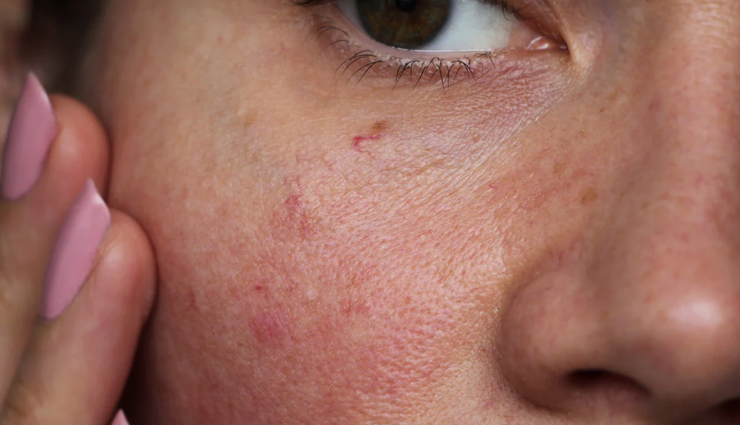7 Step Routine To Treat Sensitive Skin
By: Priyanka Maheshwari Wed, 16 Aug 2023 4:52:54

Sensitive skin refers to a specific skin type that reacts more intensely to various external factors than typical skin. Individuals with sensitive skin often experience discomfort, redness, irritation, and sometimes even allergic reactions in response to certain stimuli that wouldn't affect most people. These triggers can include environmental factors such as harsh weather conditions, pollutants, and allergens, as well as skincare products, fragrances, and even certain fabrics.
The symptoms of sensitive skin can vary widely from person to person, and they might include itching, burning, stinging, dryness, and sometimes visible signs like red patches or hives. Sensitive skin can occur on any part of the body, but it's commonly observed on the face, neck, and hands. Factors contributing to sensitive skin can include genetic predisposition, a compromised skin barrier, underlying skin conditions like eczema or rosacea, and exposure to irritants over time.
Managing sensitive skin requires a delicate and personalized approach. This might involve using gentle, hypoallergenic skincare products, avoiding harsh chemicals and fragrances, practicing a consistent skincare routine, protecting the skin from extreme weather conditions, and adopting a healthy lifestyle that includes proper hydration, a balanced diet, and stress management. If the sensitivity is severe or persistent, consulting a dermatologist is advisable to identify potential triggers and develop an effective management plan.

# Cleanser
No matter your skin type, the foundation of your skincare regimen starts with a cleanser. Opt for cleansers that are mild, devoid of sulfates and fragrances. These formulations will help safeguard the skin's barrier, eliminate impurities, and offer sufficient hydration.

# Toner
Following your cleanser, the subsequent vital component in your skincare regimen is the toner. A toner aids in the removal of expired and impaired skin cells while also providing hydration. If you have sensitive skin, it's optimal to choose toners that are devoid of alcohol and fragrances. Opt for toners containing anti-inflammatory and skin-soothing components, and consider those enriched with elements like Vitamins C and E as well as hyaluronic acid. These choices will shield the skin while maintaining its moisture balance, effectively lessening redness and irritation. Alternatively, you can explore natural options like rose water for your toning needs.

# Moisturizer
Moving forward, the subsequent product to incorporate into your skincare routine is the moisturizer. An effective moisturizer works to seal in the skin's moisture and fortify the skin barrier. Optimal moisturizer choices are those devoid of artificial fragrances and are non-comedogenic. Consider experimenting with lightweight options, like gel creams infused with ceramides, as they can offer excellent hydration while remaining gentle on the skin.

# Sunscreen
Easily responsive to environmental elements such as the sun's UV rays, sensitive skin necessitates the incorporation of sunscreen into the skincare regimen. For individuals with this skin type, it's essential to consider mineral-based choices found in the market, possessing a minimum SPF of 30. When selecting a sunscreen, prioritize options containing zinc oxide, ensuring swift absorption and non-pore-clogging attributes.

# Oil
Enhance your skincare routine by incorporating natural oils that supply both hydration and elasticity. These oils possess the added advantages of reducing inflammation, addressing skin conditions like eczema and psoriasis, alleviating sunburn, and serving as preventatives against acne, fine lines, and wrinkles. When considering oils, some of you might currently utilize essential oils. While essential oils do offer multiple skin benefits, they might not be suitable for sensitive skin due to their intricate compounds that could induce sensations of itching, redness, and flaking.
Instead of relying on essential oils, a more prudent approach involves opting for mild alternatives like jojoba oil, olive oil, shea butter, sunflower seed oil, grapeseed oil, almond oil, and rosehip seed oil. These gentler options are better suited for sensitive skin, minimizing the risk of adverse reactions while still providing valuable nourishment.

# Mask
Face masks offer substantial benefits for individuals with sensitive skin. However, exercise caution when selecting masks, avoiding options such as clay or peel-off variants, which could potentially be abrasive for the skin. Instead, consider opting for masks infused with ingredients that focus on hydration, soothing, and rejuvenation. Ingredients like chamomile, known for their ability to reduce redness and provide calming effects, are particularly suitable.
For those with sensitive skin, masks containing aloe vera and gentle colloidal oatmeal are also viable choices. These ingredients possess properties that cater to the specific needs of sensitive skin, ensuring a nurturing and soothing experience while minimizing the risk of irritation.
# Tools
Your skincare routine remains unfinished without the appropriate implements. The optimal choice for sensitive skin is the muslin cloth, renowned for its gentle attributes that become even softer over time. Muslin cloth offers an array of crucial advantages, including gentle exfoliation and thorough cleansing, effective inflammation reduction, and the stimulation of collagen production. Consequently, muslin cloth presents a viable alternative to potent ingredients like retinol.
While more advanced skincare tools such as spinning brushes are accessible, it's advisable not to integrate them into your routine on a regular basis. Frequent usage of such tools can potentially disturb the skin's pH balance, possibly leading to redness and irritation.





